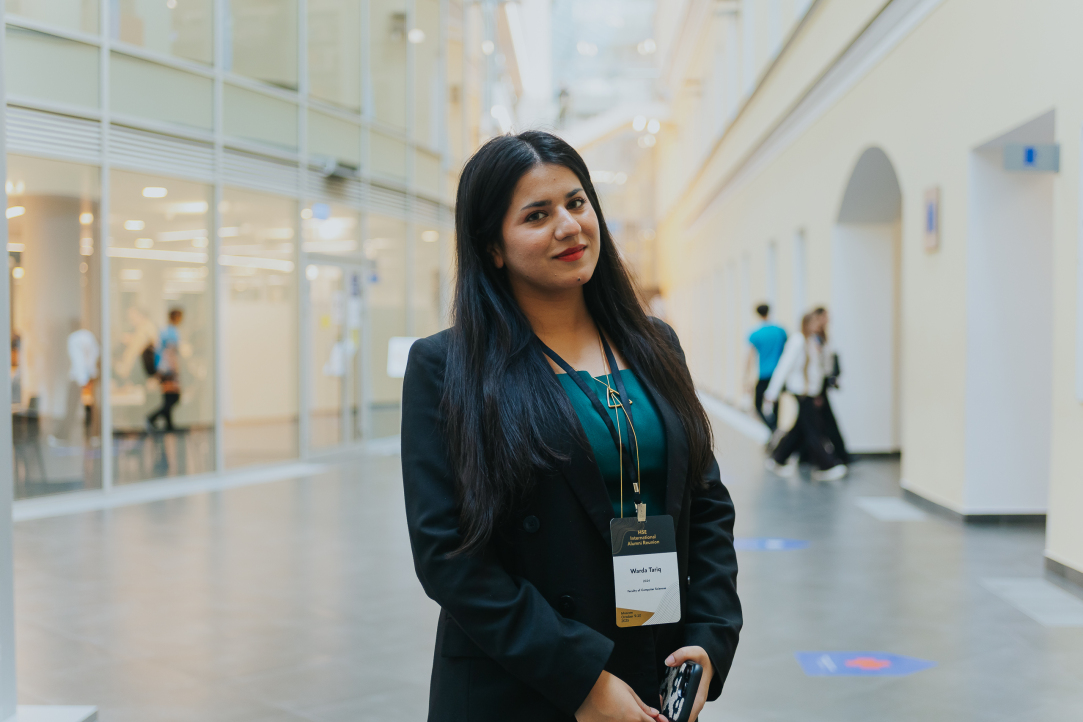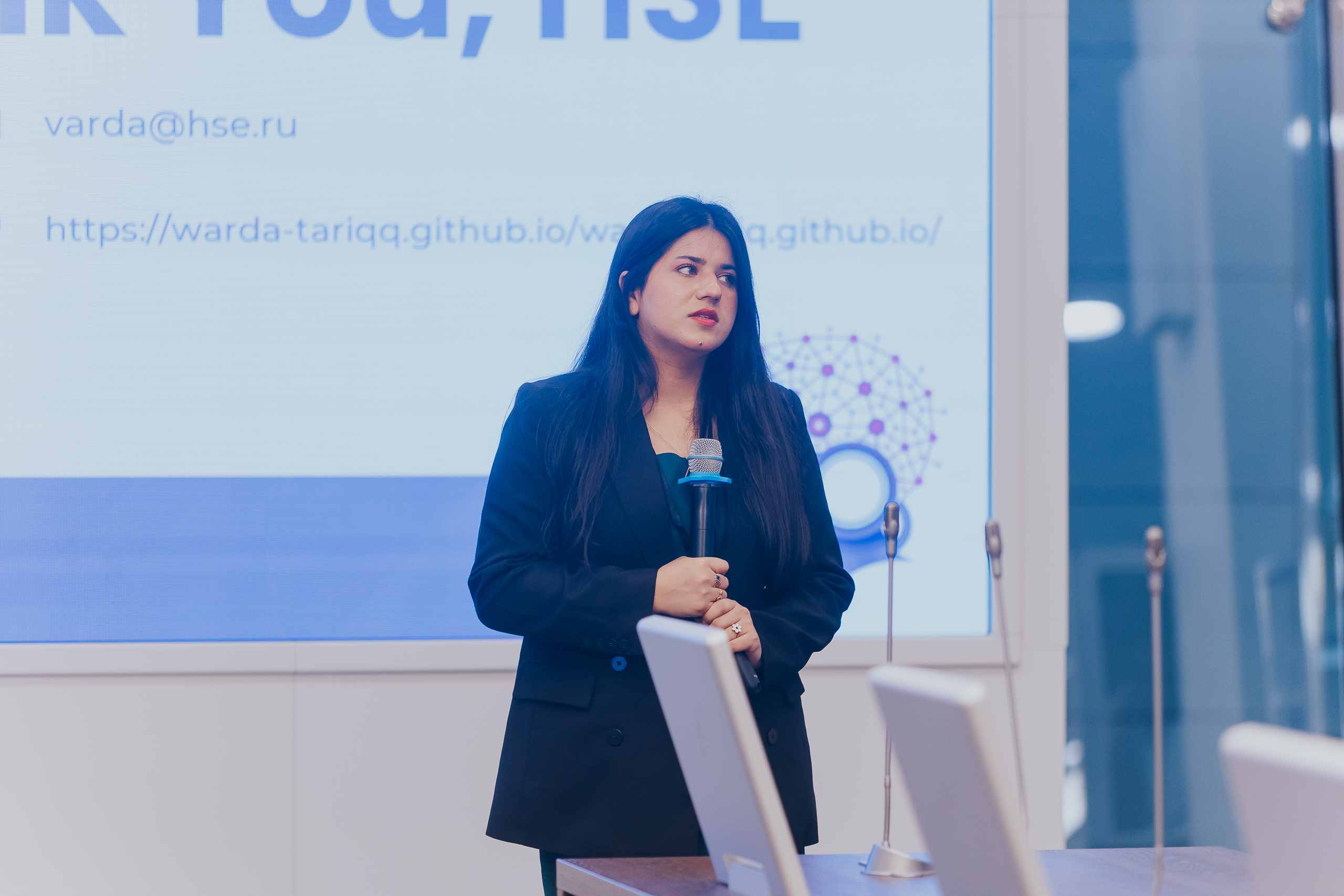‘Employers Know That HSE Graduates are Well-Prepared, Analytical, and Adaptable’

Warda Tariq, from Pakistan, completed her Master’s in Data Science at HSE University–Moscow in 2024. She is now undertaking a PhD at the Faculty of Computer Science while working remotely as an AI/ML developer. Warda spoke to the HSE News Service about blending theory and practice, what an HSE education provides apart from academic knowledge, and her advice for making the most of university.
— Tell us about your academic and professional journey so far.
— I came to HSE University because of its strong reputation for innovation, global connections, and academic excellence in computer science. I wanted to study in an environment that combined theory with real-world applications and offered opportunities to work on research projects that have a real social and technological impact.

HSE encourages students to work on applied research and industry projects. During my studies, I worked on real datasets, collaborated with companies, and presented my findings at academic events. This hands-on approach built a strong link between theory and practical application.
During my studies, I did an internship in the IT department of Sialkot International Airport (Pakistan), where I worked with databases and data management systems. This experience helped me connect theory to real-world technology
After completing my Master’s in Data Science at HSE, I continued onto a PhD in Artificial Intelligence. I also work remotely for Flomad Labs R&D (Austin, Texas) as an AI/ML developer intern, where I work on automation and AI-driven backend systems. My days are a blend of research and development. I work on my PhD research—improving low-resource language processing models—and also develop AI automation pipelines at Flomad Labs. It’s a direct continuation of what I studied at HSE: combining AI theory with practical innovation.
— How did your studies prepare you for your current activities?
— I gained perseverance and adaptability. Research often requires patience and creative problem-solving, and HSE taught me how to stay focused and curious, even when facing challenges. These qualities now help me navigate both academic research and applied AI development.
The demanding coursework and hands-on projects at HSE trained me to think critically, manage complex data problems, and communicate my ideas clearly.
I learned how to turn abstract theories into practical solutions—a skill that directly supports my work as an AI/ML developer and researcher
The courses in Natural Language Processing, Machine Learning, and Statistical Modelling guided me toward my current research interests, and mentors such as Prof. Vasilii Gromov, Prof. Victor Popov, and Prof. Sergei Kuznetsov encouraged me to combine linguistic analysis with AI methods. This deeply inspired my research direction and later became the foundation of my PhD topic of low-resource language technologies.

One of my major accomplishments was born directly from my HSE research work: my paper on ‘Building a Clean Bartangi Language Corpus and Training Word Embeddings for Low-Resource Language Modeling,’ which I presented at the RANLP 2025 Conference.
— Apart from academic knowledge, what are the other benefits of an HSE education?
— HSE’s reputation for academic excellence and research makes its degrees highly respected worldwide. Employers recognise that HSE graduates are well-prepared, analytical, and adaptable—qualities that are essential in the technology and AI sectors.
While some courses were quite challenging, they taught me the importance of consistent effort and collaboration.
Working through complex assignments helped me understand that learning is not just about results, but about the process of exploring, failing, and improving
HSE’s environment also helped me become confident in multicultural teamwork. Studying and collaborating with peers from different countries taught me to respect diverse perspectives and adapt my communication style—a skill that’s been very useful in my international research collaborations and my current remote internship.
In addition, the HSE alumni network has been incredibly supportive. It connects students and professionals from around the world who share similar experiences. I’ve met many alumni who have offered advice, mentorship, and even research collaborations, both in academia and industry.

— What are your plans for the future? What advice do you have for people starting out on the same path?
I aim to continue contributing to research at the intersection of AI, language technology, and sustainability. My long-term goal is to develop intelligent systems that promote digital inclusion and social impact. HSE has given me the academic foundation, research experience, and global confidence to pursue this path.
My advice is not to limit yourself to just classroom learning—get involved in research early, take part in competitions, and build your own projects
These experiences teach problem-solving and teamwork, which are essential for success in AI and data science. Embrace challenges and never hesitate to ask questions. Every obstacle is an opportunity to learn something new. Even when the path feels uncertain, it’s important to stay open-minded and keep exploring—HSE rewards curiosity.
See also:
‘Start Working on Your Articles from the Very Beginning of Your PhD’
Andrés Castañón Rincón, from Spain, is a doctoral student at the HSE School of Philosophy and Cultural Studies in Moscow working on the history of Soviet Marxism philosophy. In his interview with the HSE News Service, he explains why studying Soviet Marxism is relevant today, talks about the advantages and challenges of his work in Moscow as an international researcher, and gives some advice to beginner PhD students.
‘Everyone Who Sees HSE University on My CV Says: “You Must Be So Smart!”’
On October 9–10, the first-ever HSE International Alumni Reunion brought together graduates from various cohorts and programmes—now working in Russia and abroad—along with representatives of HSE University and its industry partners. The event included a tour of the campus, a business game, and a cultural festival. The participants exchanged experiences, reflected on their career paths, and discussed labour market challenges.
‘Education is the Mother of all Disciplines’
Moses Oluoke Omopekunola, from Nigeria, is a second-year student of the Science of Learning and Assessment (SOLA) programme. Intent on pursuing a career in psychometrics, he has already joined the PhD programme in Education to deepen his knowledge of the theory and methodology of learning. In this interview with the HSE News Service, Moses explains how his master’s programme aligns with his future plans, recalls the challenges he has faced, and shares the most valuable lessons he has learned so far.
Russian and Chinese Scholars Share Experience of Transformation of Doctoral Education
The Russian and Chinese postgraduate education systems originally borrowed their institutional frameworks from the Soviet Union. However, in the 21st century, they have evolved along different paths. While key performance indicators for postgraduate programmes in Russia are declining, China is seeing a rapid increase in the number of postgraduate students. These contrasting trajectories and the reforms undertaken in each country in recent decades were the focus of a roundtable discussion held as part of the 25th Yasin (April) International Academic Conference.
HSE Winter School on Analytics and Data Science Brings Together Specialists in Different Fields
In early February, the HSE Cultural Centre hosted ‘IT Session: Immersion in the Data World’, a winter school on analytics and data science organised by the Continuing Education Centre of the Faculty of Computer Science. More than four hundred participants attended lectures by speakers from Yandex, T-Bank, MTS, Okko, Kuper, Avito, Bank of Russia, Beeline, as well as FCS experts. The event gathered both early-career analysts and students, as well as experts seeking to better understand how analytics and data science can be applied in various industries.
‘Everyone Here Is Eager to Connect and Collaborate’
Syed Zeeshan Raza Zaidi is a 23-year-old international student from Karachi, Pakistan. He is currently a first-year master’s student in Cognitive Neuroscience at HSE University in Moscow seeking to explore the complexities of human behaviour and cognition from a multidisciplinary perspective. Syed spoke to the HSE News Service about why HSE is the best place to realise his potential, what makes Moscow and Karachi so similar, and why he misses home-cooked food most of all.
HSE University-St Petersburg Holds Pakistani Culture Night
On November 9, the building on Kantemirovskaya Street hosted Pakistani Culture Night. More than 80 people attended the event, including students and alumni of St Petersburg universities as well as Raja Qadeer Ahmed, a representative of the Embassy of the Islamic Republic of Pakistan. The event was organised by Syed Junaid Abbas, an international student of HSE University-St Petersburg.
Diversity of Cultures, Values, Traditions: Orientation Session for International Students
At the end of August, HSE University held orientation events for first-year international students. Nearly 800 students from 70 different countries attended sessions at the HSE Cultural Centre to learn about the visa and migration processes for staying in the Russian Federation, the opportunities at HSE and the student life there. They also took a tour of the Pokrovka campus.
Doctoral Student Explores the Challenges Faced by International PhD Seekers During the Pandemic
In late June 2024, a pre-defence of Nurudeen Abdul-Rahaman’s dissertation took place at the HSE Institute of Education. Nurudeen Abdul-Rahaman, a doctoral student from Ghana, has presented his dissertation ‘Academic and Social Integration of Foreign Doctoral Students at Russian Universities during the Covid-19 Pandemic’ for the degree of Candidate of Sciences in Education (PhD).The HSE News Service spoke with Nurudeen as well as his academic supervisor, Evgeniy Terentev, Director of the Institute of Education, about their extensive research on international doctoral students in Russia and Nurudeen's contribution to this research.
‘We Cannot Understand the Modern Ideological Confrontation without the Accusations that Emerged during the Lausanne Process’
Rainer Matos Franco, from Mexico, defended his PhD thesis with honours at HSE University this June. In his dissertation, Rainer Matos Franco examines the history of anticommunism in Europe during the 1920s. The HSE News Service spoke with Rainer and his academic supervisor, Tatiana Borisova, about the significance of the Lausanne Process for the Cold War and contemporary history, the opportunities provided by HSE University for international PhD candidates, and the challenges of working with a vast database of historical sources.


